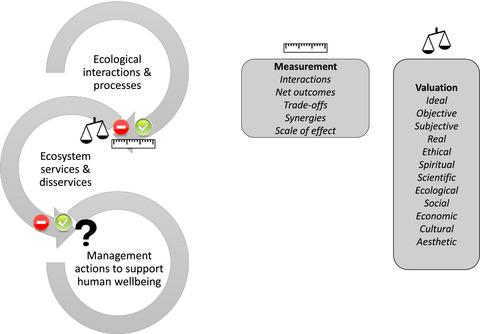当前位置:
X-MOL 学术
›
J. Appl. Ecol.
›
论文详情
Our official English website, www.x-mol.net, welcomes your feedback! (Note: you will need to create a separate account there.)
Conceptual ambiguity hinders measurement and management of ecosystem disservices
Journal of Applied Ecology ( IF 5.7 ) Pub Date : 2020-06-11 , DOI: 10.1111/1365-2664.13665 Manu E. Saunders 1
中文翻译:

概念上的歧义阻碍了对生态系统损害的衡量和管理
更新日期:2020-06-11
Journal of Applied Ecology ( IF 5.7 ) Pub Date : 2020-06-11 , DOI: 10.1111/1365-2664.13665 Manu E. Saunders 1
Affiliation

|
- The term ‘ecosystem disservices’ is used to refer to ecological costs that humans experience from nature. Managing ecosystems to protect ecosystem function and minimize costs to human well‐being is a global imperative.
- Like ecosystem services, disservices are outcomes of ecological processes and interactions. They are supplied concurrently with ecosystem services, not as isolated outcomes of ecosystem function. Therefore, accurate measurement of disservices must identify the ecological interactions contributing to the disservice, as well as any associated services. Despite regular calls for increased rigour around measuring services and disservices, conceptual and methodological ambiguities dominate the ecosystem disservices literature.
- A systematic literature review revealed 85 studies that aimed to explicitly identify or measure ecosystem disservices. Only 13 studies met both essential criteria for an empirical assessment of disservices: identification of the ecological interactions supplying the disservice and identification of associations between services and disservices.
- Most empirical studies identify ecosystem disservices based on subjective opinions or proxy data, and rarely acknowledge how disservices are related to services within the system. Some identify the presence of unwanted organisms, management costs, minor nuisances and personal aversions as ecosystem disservices.
- Synthesis and applications. Disservices are supplied concurrently with ecosystem services and human perceptions do not always accurately represent ecological costs in social–ecological systems. Hence, knowledge of the ecological interactions underlying perceived and actual disservices is vital for evidence‐informed decision‐making that sustains biodiversity and human well‐being.
中文翻译:

概念上的歧义阻碍了对生态系统损害的衡量和管理
- “生态系统损害”一词用于指人类从大自然中经历的生态成本。管理生态系统以保护生态系统功能并最大程度降低人类福祉的成本是全球性的当务之急。
- 像生态系统服务一样,损害是生态过程和相互作用的结果。它们与生态系统服务同时提供,而不是作为生态系统功能的孤立结果提供。因此,对残障的准确测量必须确定造成残障的生态相互作用以及任何相关服务。尽管经常要求在测量服务和损害方面更加严格,但概念和方法上的歧义在生态系统损害文献中仍占主导地位。
- 一份系统的文献综述揭示了85项旨在明确识别或衡量生态系统损害的研究。只有13项研究同时满足了对残疾人进行实证评估的两个基本标准:确定提供残疾人的生态相互作用以及确定服务与残疾人之间的关联。
- 大多数经验研究都基于主观意见或代理数据来识别生态系统损害,而很少承认损害与系统内服务之间的关系。有些人认为有害生物的存在,管理成本,小小的滋扰和对人的厌恶会破坏生态系统。
- 综合与应用。损害与生态系统服务同时提供,而人类的观念并不总是准确地代表社会生态系统中的生态成本。因此,了解潜在的危害和实际危害之间的生态相互作用对于维持生物多样性和人类福祉的循证决策至关重要。



























 京公网安备 11010802027423号
京公网安备 11010802027423号